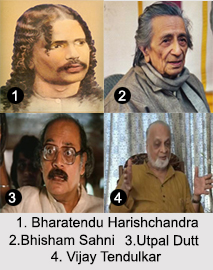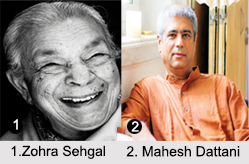 The tale of changing ritualism and changing tradition can be best understood amidst the magic and charm of Indian theatre. The history of Indian theatre is deeply buried in the long gone era of the Sanskrit plays. The eminent Indian dramatists since then have added a distinct shape to Indian Natya whilst exemplifying the nine Rasas of drama.
The tale of changing ritualism and changing tradition can be best understood amidst the magic and charm of Indian theatre. The history of Indian theatre is deeply buried in the long gone era of the Sanskrit plays. The eminent Indian dramatists since then have added a distinct shape to Indian Natya whilst exemplifying the nine Rasas of drama.
History of Indian Drama & Theatre
Theatre in India is as old as the Indian culture. India therefore boasts its glorious association with illustrious Indian dramatists since its antiquity. Theatre even in the ancient India was coherent and it was with the introduction of the Sankrit theatre, Indian drama was delineated for the very first time. The earliest phase of Sanskrit theatre includes the writing of the Indian dramatists which was based almost entirely on the rules and modifications laid down in the Natya Shastra. Shudraka, Harsha, Visakhadatta, Bhasa, Kalidasa and Bhavabhuti were the six prominent Indian dramatists of all times who have delineated the structure of Indian theatre through their dramatic pieces in Sanskrit.
The glory of the Sanskrit plays which was once a prominent part of the Indian theater in the ancient age somewhat faded away during the medieval time. Renowned Indian dramatists in the middle ages offered an innovative touch to Indian drama whilst making it lot more vibrant. For the very first time the Indian dramatists of the medieval era uniformly blended dance, mime and musical form to structure a whole new type of Indian drama that has been later classified as the Indian classical dance drama. The great art expert, King Laksmanya Manikya composed two plays namely Vikhyata-vijaya and Kuvalayashva-charita during this period and set the tone for the mythological and classical plays in Indian entertainment scenario. The study of Indian dramatists of the medieval era is again incomplete without the mention of Krishnachandra Roy who was then the tributary king of Nabadwip. His remarkable plays like the Chandi, Mahisasura Vadha and Chitra-yajn still echoes the glory of medieval India.
Some of the famous Indian Dramatists are:
Krishna Mishra: One of the famous Indian dramatists is Krishna Mishra. She is a playwright who wrote the book `Prabodha Chandrodaya`. The manuscript `Prabodha Chandrodaya` means Rising of the Moon of Awakened Intellect. This is a theological and philosophical drama.
 Bharatendu Harishchandra: Bhartendu Harishchandra (9 September 1850 - 6 January 1885) is known as the "Father of modern Hindi literature" as well as "Hindi theatre". He is considered as one of the utmost Hindi writers of modern India. His pen name was "Rasa". Some of his works are - Vaidiki himsa hitnsa na bhavati, Jabbalpur, Bharat durdasha, Bharat Sarvagya, Prem Maduri, Varsha Vinod, Chandravali and Krishan Charitra, Bharatendu Grnthaaolly etc.
Bharatendu Harishchandra: Bhartendu Harishchandra (9 September 1850 - 6 January 1885) is known as the "Father of modern Hindi literature" as well as "Hindi theatre". He is considered as one of the utmost Hindi writers of modern India. His pen name was "Rasa". Some of his works are - Vaidiki himsa hitnsa na bhavati, Jabbalpur, Bharat durdasha, Bharat Sarvagya, Prem Maduri, Varsha Vinod, Chandravali and Krishan Charitra, Bharatendu Grnthaaolly etc.
Prithviraj Kapoor: Prithviraj Kapoor (3 November 1906 - 29 May 1972) was a pioneer of the Hindi film industry and theatre, who started his career as an actor in the silent era of Hindi cinema. He was related with IPTA as one of its founding members and who founded the Prithvi Theatres, a travelling theatre company based in Mumbai. Government of India honored him with Padma Bhushan in 1969 and the Dadasaheb Phalke Award. Some of his films are - "Alam Ara", "Seeta", "President", "Vidyapati", "Dahej", "Mughal-e-Azam", "Daku Mangal Singh", "Heer Raanjha", "Kal Aaj Aur Kal" etc.
Bhisham Sahni: Bhisham Sahni was a Hindi writer, playwright, and actor, famed for his novel and television screenplay Tamas, a powerful and passionate account of the Partition of India. He was awarded with the Padma Bhushan for literature in 1998, and the Sahitya Akademi Fellowship in 2002.
Badal Sircar: Badal Sircar is a prominent name in the area of contemporary theatre. He represents the New Theatrical Movement in India. He has shaped an appropriate "people"s theatre" that is, a theatre supported and created by people. His plays include Evan Inderjit, That Other History and There Is No End. All these plays are based on political, social, psychological and existential problems. Sarkar was awarded with the Jawaharlal Nehru Fellowship, Padma Shri, Sangeet Natak Akademi Award and the Sangeet Natak Akademi Fellowship- Ratna Sadsya, the highest honor in the performing arts by Govt. of India given by Sangeet Natak Akademi.
Vijay Tendulkar: Vijay Tendulkar (6th January 1928 - 19th May 2008). He was Indian playwright, movie and television writer, literary essayist, political journalist, and social critic chiefly in Marathi. He is known for his plays "Shantata! Court Chalu Aahe" "Ghashiram Kotwal" and "Sakharam Binder". Tendulkar wrote screenplays for the movies "Nishant", "Akrosh" and "Ardh Satya". He was honored with the Sangeet Natak Akademi Award, National Film Award for Best Screenplay for Manthan, Padma Bhushan, Saraswati Samman, Kalidas Samman etc.
Rabindranath Tagore: Rabindranath Tagore was a Bengali artist, who reshaped Bengali literature and music, as well as Indian art with Contextual Modernism in the late 19th and early 20th centuries. Tagore wrote primarily in Bengali but almost all his Bengali plays are available to us in English renderings. His prominent plays, Chitra, The Post Office, Sacrifice, Red Oleanders, Chandalika, Muktadhara, Natir Puja, and others, are firmly rooted in the Indian ethos and ethics in their themes, characters and treatment.
Kalidasa: Kalidasa was a Classical Sanskrit writer, widely regarded as the greatest poet and dramatist in the Sanskrit language. His plays and poetry are primarily based on the Hindu Puranas.
Chandrashekhara Kambara: A major writer in Kannada language, known for his effective practice of North Karnataka dialect of Kannada in his plays and poems. His plays revolve around folk or mythology inter-linked with modern issues and he achieved a merge of the folk and modern theatrical forms. His 22 plays include the popular Aramane, Mahamayi, Singaravva, Harakeya Kuri and Kulothe Chingaramma, as well as Jokumaraswamy and Sirisampige which have been translated into many languages.
Utpal Dutt: The pioneer of the Modern Indian Theatre, he was one of the founding members of the IPTA. Among all his plays, Kallol is a famous one which was banned for months by the then Congress-led West Bengal Government.
Zohra Sehgal: Zohra Sehgal (27 April 1912 - 10 July 2014) was an Indian actress, dancer, and choreographer. Some of her films include Neecha Nagar, Afsar, Bhaji on the Beach, The Mystic Masseur, Bend It Like Beckham, Dil Se.., Saawariya and Chalo Ishq Ladaaye, Cheeni Kum; and the TV series like The Jewel in the Crown, Tandoori Nights, Amma and Family. She acted with Indian People`s Theatre Association (IPTA) and Prithviraj Kapoor`s Prithvi Theatre for 14 years.
She was awarded the Padma Shri, Kalidas Samman, the Sangeet Natak Akademi. India`s National Academy for Music, Dance and Drama presented her with its highest award, the Sangeet Natak Akademi Fellowship for lifetime achievement. She received the Padma Vibhushan.
Mahesh Dattani: Mahesh Dattani (born 7 August 1958) is an Indian director, actor, playwright and writer. He wrote plays as Final Solutions, Dance Like a Man, Bravely Fought the Queen, On a Muggy Night in Mumbai, Tara, Thirty Days in September and `The murder that never was`. He is the first playwright in English to be awarded with the Sahitya Akademi award. He has received the Sahitya Kala Parishad award also.
Indian dramatists have aided in developing Indian theatre as the "total theatre" whilst reverberating the authenticity of the contemporaneousness in Indian drama.




